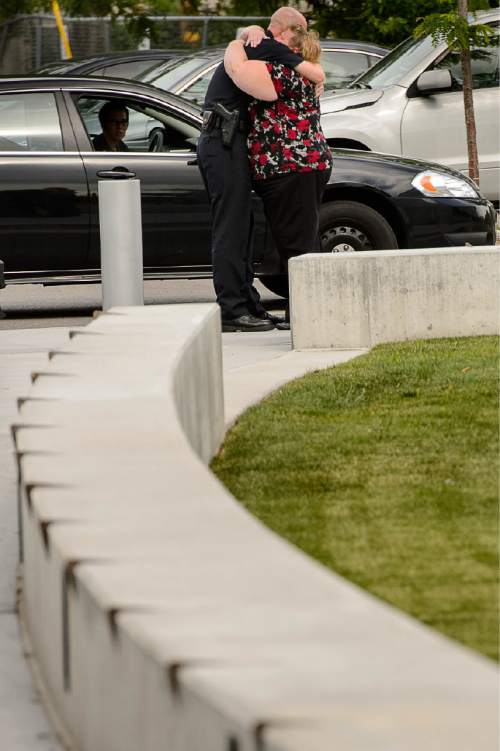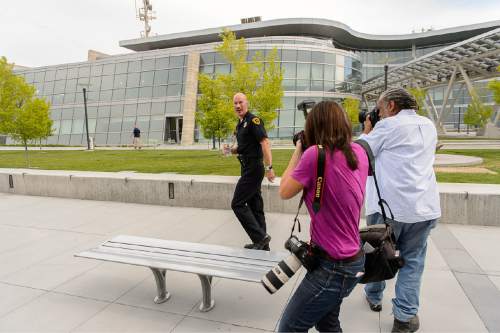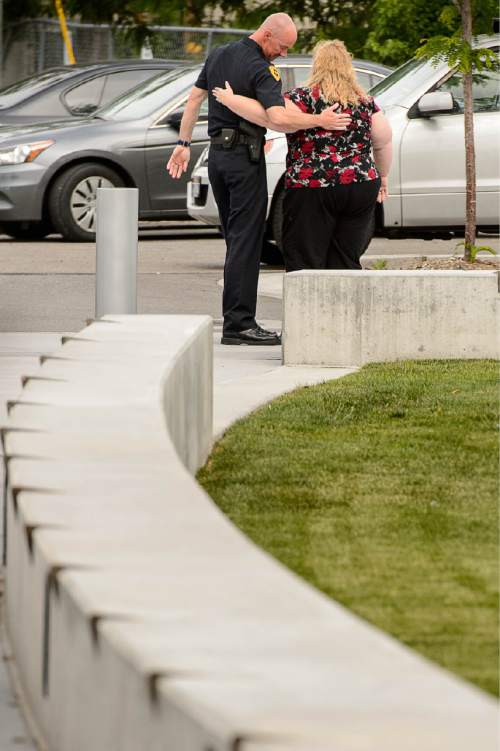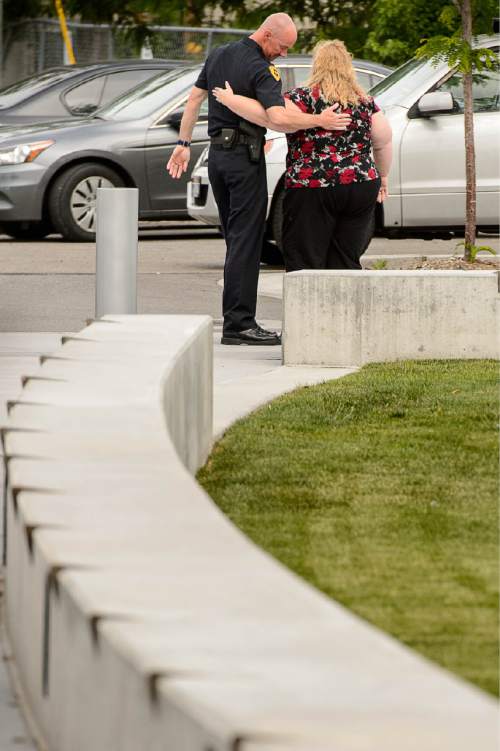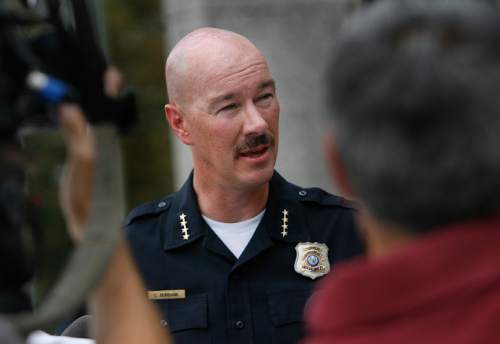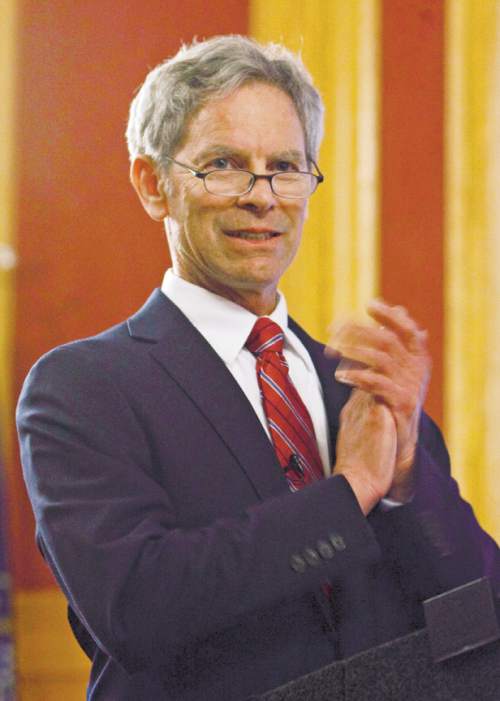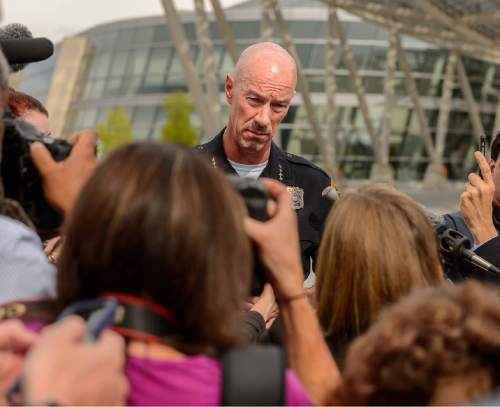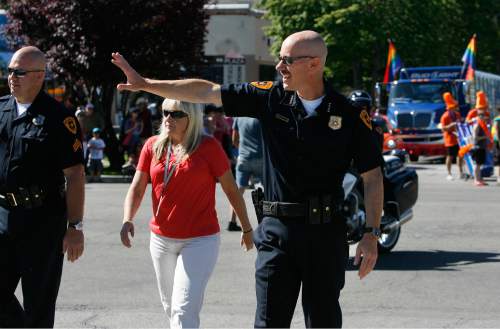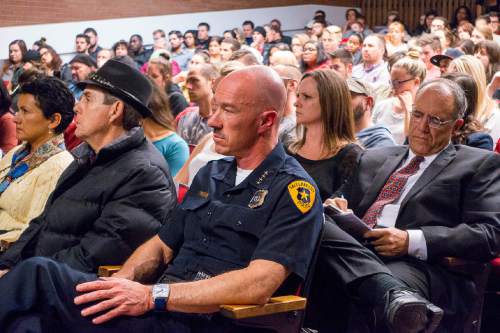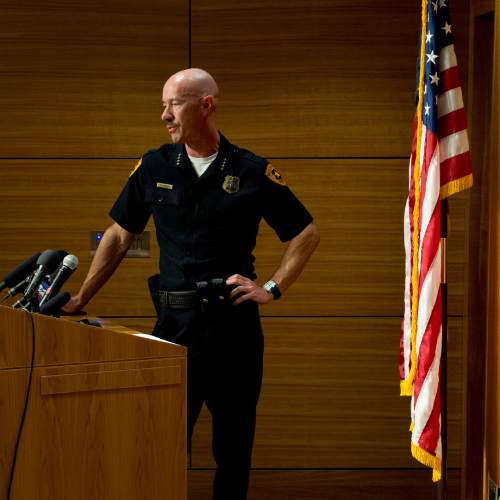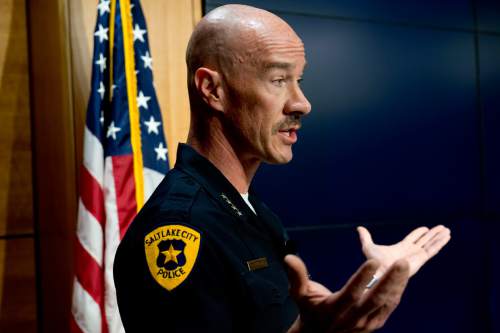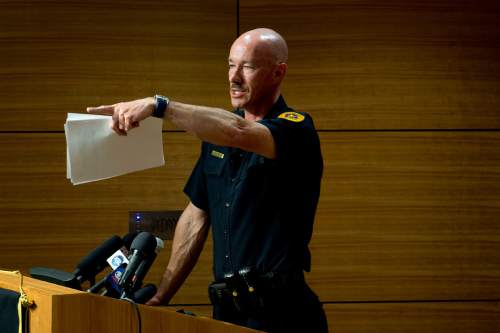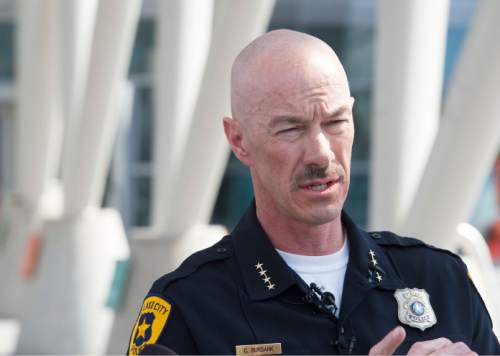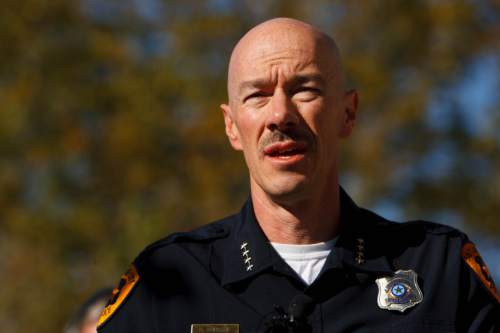This is an archived article that was published on sltrib.com in 2015, and information in the article may be outdated. It is provided only for personal research purposes and may not be reprinted.
Salt Lake City Mayor Ralph Becker on Thursday announced the resignation under pressure of Police Chief Chris Burbank in connection with the mishandling of substantiated sexual-harassment complaints brought by three female officers.
Becker said the chief last year failed to demote the deputy chief accused of harassment, contrary to the direction of the mayor's office. While he asked Burbank to appear by his side at a hastily called press conference Thursday afternoon to acknowledge mistakes in handling the case, the chief declined.
"So it is with personal regret that I announce today Chief Burbank's departure from Salt Lake City government," Becker said.
Deputy Chief Mike Brown was named acting chief.
In a separate news conference of his own later in the day, Burbank, a nine-year veteran, defended his actions in putting then-deputy Rick Findlay on paid leave for several months until he retired with full benefits last June, instead of demoting him.
Burbank said he could not agree to the mayor's "ultimatum" of reading a prepared statement and apology. He said he was given only minutes to decide whether to read the statement in front of TV cameras and reporters, resign or be fired. He considered the statement "wholly inappropriate," and resigned.
"I'm not a politician, I'm a public servant," Burbank said. "This decision is not in the best interest of the public, it's election politics and it's extremely unfortunate."
The sexual-harassment case in question involved substantiated complaints by three officers, who said they were later retaliated against.
Burbank said he believes he handled the case appropriately and that discipline is a policy matter, not a political one.
"I firmly believe that the police department and myself personally have handled sexual harassment with zero tolerance," he said.
There was never a recommendation from the mayor's office that Findlay be fired, Burbank said. He said that under the state retirement system, Findlay also would have received full benefits if he had been demoted.
"I made a decision that I thought best for the organization, based on he was no longer in the workplace," Burbank said. "I wanted him out of the workplace, which was very important to me because it was a circumstance that I would not tolerate."
The mayor did not take any public action or comment on Findlay's departure until the issue was revived late last month when the women filed a notice of claim against the city — the precursor to a lawsuit.
But Thursday, the mayor apologized publicly to the victims. "The pain and suffering you and your loved ones faced is terribly wrong, demeaning and grossly unfair."
Ed Brass, an attorney for the women, said Thursday's developments were not discussed with the women, who "had no input in the decision-making process."
His clients, Brass said, "want justice whatever that turns out to mean in the end, and they are not happy about anyone losing their job. That's not their desire. Their desire is to be treated the same as anyone else."
The chief's departure "does not correct what happened in the past. It may demonstrate on the part of this administration an attitude that this will not be tolerated in the future. It doesn't change what's already happened," Brass said.
The officers — Tiffany Commagere, Sgt. Robin Heiden and former Lt. Melody Gray — say Findlay shared with other male officers an image of a nude woman whom he claimed was Commagere, and pictures of Gray and Heiden in bikinis which were taken from Gray's phone without her permission.
The women also contend they were dissuaded from complaining about Findlay because he occupied a position of authority over them and was in charge of Internal Affairs, which screens officer complaints.
When they did complain, the notice of claim says they were retaliated against, an investigation was delayed and Findlay was allowed to retire with full benefits.
A December 2013 review of the complaints by the Salt Lake City Civilian Review Board found Findlay, who was hired in June 1994, had violated the city's sexual harassment policy and committed conduct unbecoming of an officer. A second review, by the city's human resources department, made the same findings.
In a disciplinary letter to Findlay dated June 4, 2014, Burbank concluded the allegations had been sustained but said "your conduct did not rise to the level of termination." The deputy chief resigned that month.
In recent weeks the matter was reignited with the women officers filing their notice of claim. The mayor has been criticized by election challengers, particularly former state legislator Jackie Biskupski and City Council Chairman Luke Garrott.
"I find it hard to believe the mayor took this as seriously as he is now saying," Garrott said Thursday. "It's negligence in oversight from the mayor's office. And frankly, it comes from the way Ralph manages — hands off and absent."
Biskupski also lambasted Becker for his handling of the matter, and for saying at his press conference that his opponents would use any action of his administration to their political advantage.
"I don't know how he can suggest that we are trying to make political hay of this," Biskupski said. "This came to light because of a lawsuit, not because I decided to poke the mayor," she said.
If the situation had been handled properly, Biskupski said, there most likely wouldn't be a lawsuit.
Becker's office said he had previously been silent on the issue out of concern for the women police officers' privacy, but the public notice of claim changed things.
On Thursday he released what had been a confidential letter from his chief of staff David Everitt to Burbank, dated June 12, 2014, that chastised the chief for handling Findlay's discipline in a way "specifically contrary to what we agreed upon" — demotion.
"Instead, you allowed a deputy chief to resign with zero discipline imposed.… Your actions in this matter border on insubordination."
Everitt also said Burbank's penalty-free treatment of Findlay "damaged the reputation of both the [police department] and city regarding personnel management." And he criticized the department's unilateral approach to personnel matters generally and "an apparent cultural issue regarding women."
Burbank, still wearing his uniform Thursday, stood by his action, saying he handled disciplinary matters in a consistent and equitable manner.
"A police department should be run independently of politics," he said. "How discipline is handled is a policy matter, not a political matter."
When asked if he thought Thursday's ultimatum stemmed from election-year politics, Burbank replied, "I certainly do because there has been no discussion between then and now and then all of the sudden this pops up and certainly it was made an issue in city council, it was made an issue in the newspaper."
In an interview about the Findlay case a year ago, Becker spokesman Art Raymond told The Tribune that Burbank had "full discretion" to mete out discipline. The city policy to leave these decisions up to department heads was confirmed in a city council meeting last week by human resources director Debra Alexander. Council members expressed concern and a desire to put more clear guidelines in place for handling sexual-harassment and retaliation complaints.
Lee Davidson, Jennifer Dobner and Shaheed Morris contributed to this report.


